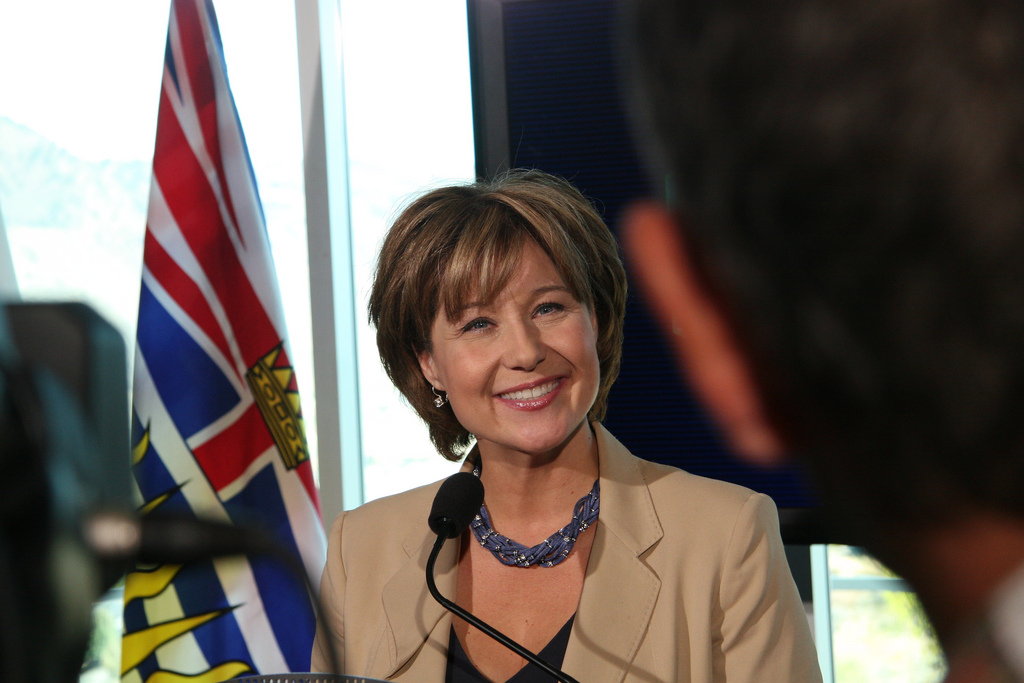
Premier Christy Clark, pictured at Thompson Rivers University on Sept. 21, 2011, faces an uphill battle this election, with attack ads coming from all sides. Photo by TRU via Flickr/Creative Commons
The writ has dropped for the 41st British Columbia general election, meaning the next three and a half weeks will be chock full of lawn signs, political statuses on Facebook, and awkwardly angry campaign advertisements leading up to election day on May 9.
I understand if reading that made you feel a little physically sick. It’s been just about impossible to not feel bombarded with stories about governments and elections, with U.S. politics dominating news feeds from here to . . . well, just about anywhere.
But the B.C. election is a very different beast from a U.S. election, with a different system, players, and set of issues at the forefront of politicians’ and voters’ minds. For most students at UVic, this will be their first ever glimpse at what a provincial election looks like on the West Coast.
First, the basics . The three major parties running are: the B.C. Green Party, the B.C. New Democratic Party (NDP), and the B.C. Liberal Party (with a few smaller parties like the B.C. Conservatives and the Communist Party of British Columbia running candidates in select ridings). Like the Canadian federal election, you vote for the MLA (or Member of the Legislative Assembly — the provincial version of an MP) in your riding. Each riding elects one MLA, and the party with the most MLAs is in control of the provincial government.
It can be difficult to determine what exactly each level of government is responsible for, but, as UVSS Director of Campaigns Maxwell Nicholson explains, the provincial government is in charge of a lot of crucial issues for university students.
“I think education is a big one — post-secondary education . . . a lot of the work that I’ve done lobbying on student issues has been almost entirely provincially,” Nicholson says. “Things like the student interest rate — that’s going to be a provincial decision . . . transit — the federal government can give funding for transit but ultimately that’s going to be provincial. Job creation . . . that’s going to be inherently provincial too.
“[In federal politics] you get a broader ideology — where do we see ourselves as a country?” Nicholson says. “But I think you can look at provincial [politics] as being very, very practical, because there’s a whole ton of provincial issues, especially for students, that are going to have a big impact on our day-to-day lives.”
And with such important issues on the line, things may get heated. Andrew Macleod is the Legislative Bureau Chief for The Tyee, an online B.C. news magazine, and he believes that this election is shaping up to be more belligerent than those in previous years.
“The best comparison would be to the last [provincial election in 2009] where the NDP said they were going to keep it positive,” says Macleod. “[This time] both sides have been picking at each other with the negative ads, with the whole [B.C. premier] ‘Christy Clark — Not Working For You’ slogan and the ‘Say Anything John’ [Horgan, leader of the B.C. NDP] slogan. I would say, compared to the last [election], there’s more of a negative tone to this one.”
Thankfully, says Nicholson, the election is set to be a little less intense than that of our neighbors to the south.
“There’s going to be a fair share of drama and jabs, because they’re trying to make their party look good and the other parties look bad,” he says, “but I’d be very surprised if it was anywhere near as bad as the U.S. election was as far as the polarization [goes].”
Since classes have finished for the semester, Nicholson doesn’t expect a lot of election activity on campus. That doesn’t mean, however, that UVic students can’t find out which party is best suited for them.
“I feel like students will have an implicit idea of what the different parties stand for, but ultimately you can spend days and days becoming more and more informed, and I think that’s up to the different student and different voter,” Nicholson says. “We [at the UVSS] encourage students to read up on the issues and find the ones that matter most to them.”
If you’ve lived in B.C. for the past six months, you can still vote! All you need is photo ID and a document with your address on it. Check out elections.bc.ca for more information. Check out martlet.ca for more on local candidates in the coming weeks.







